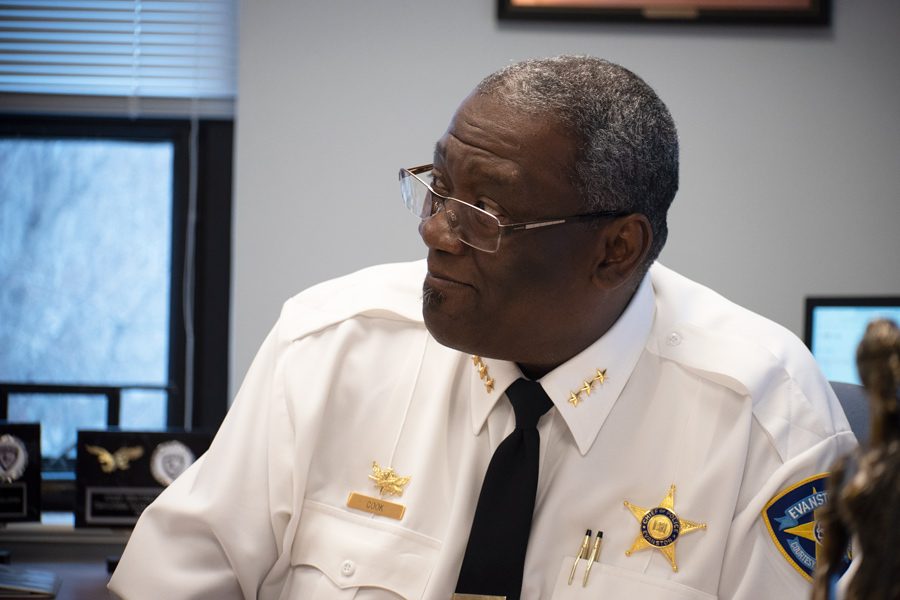Mayor Hagerty discusses use of force and body cameras at Q&A
Daily file photo by Christopher Vazquez
Police Chief Demitrous Cook. Cook outlined Evanston Police Department’s practices in terms of 8 Can’t Wait during Hagerty’s discussion on Monday.
July 27, 2020
Mayor Steve Hagerty hosted a discussion on use of force and body cameras Monday, the fourth in his series of Q&As and discussions on policing in Evanston.
At the virtual event, Hagerty focused on 8 Can’t Wait, eight policies involving forceful techniques that, if banned, are believed to reduce police killings. He asked Police Chief Demitrous Cook and Deputy Chief Jody Wright about the statuses of all eight policies in the Evanston Police Department’s practices.
Cook and Wright verified that EPD uses de-escalation techniques and warnings before shooting, has a general order of duty to intervene and reports incidents in which officers threaten to use force or use force against civilians. Officers are also not permitted to use chokeholds, and follows state law that permits shooting at moving vehicles only in a case where deadly force is deemed necessary, such as if an individual attempts to run an officer over. However, EPD does not have a specific policy that requires officers to exhaust all alternatives to deadly force, including non-force and less lethal force options.
“Every use of force situation is unique, and some situations are more complex than others. Officers are trained to use enough force to defeat the threat that their encounter (is) at the time, and in doing so, they take a look at the totality of the circumstances of that particular situation,” Wright said. “So it may not be feasible for an officer to confront a threat of deadly force with something that would not defeat that threat.”
Wright also discussed another item on the 8 Can’t Wait list, the use of force continuum, a policy that includes predetermined force options to use to defeat a threat. Although the continuum is not absolute, it provides a guideline of what techniques officers may start with in an attempt to control a situation.
“In years past, people would look at a continuum and think it’s an escalation of your use of force, but it’s also an escalation down as well,” Wright said. “So you may be met with a level of force that may dictate you to use a higher level, but with de-escalation training…you can move down and continue on, based on verbal commands and direction.”
Chris Burbank, vice president of law enforcement strategy for the Center for Policing Equity, said some of the standards outlined in 8 Can’t Wait have been in place for years, yet disparities in outcomes continue to occur.
That disparity exists, he said, due to a failure to accurately measure the success of policies or practices used by the police.
“We see people time and time again, in essence, abusing this system. This is more about the expectation that we as a society have for law enforcement and the rules by which they operate,” Burbank said. “We as a society, you as a community, need to start taking a look scientifically and measuring… the data that you have available.”
Hagerty then moved on to the subject of body cameras. According to Cook, the use of body cameras is governed by state law, as well as in EPD’s general orders. Cameras are designed to run for up to ten hours at a time, and because of this, officers on duty are required to have their body cameras on at all times, except for when they are in the police station and squad cars. If an officer enters a home, Cook said the resident has a right to request that the officer turn the camera off. If any violence occurs, the officer can turn it back on.
According to Hagerty, EPD has a team that periodically reviews footage from body cameras to check that officers are following proper practices. Cook said that many times, the department even takes action on video footage that residents have not complained about. If this footage presents a situation in which EPD may be liable, he said the legal department is notified.
“A lot of things happen with these videos where police officers try to circumvent what’s on a video, but my perspective is, if you don’t have that video, it’s going to be corrective action in terms of disciplining with you,” Cook said. “I’m going to lean toward more what the citizen is saying with respect to what happens.”
Email: [email protected]
Twitter: @juliaa_grace
Related Stories:
— Mayor Hagerty, Cook County police force members discuss police training
— Local academics, Evanston officials discuss race and policing in virtual roundtable


